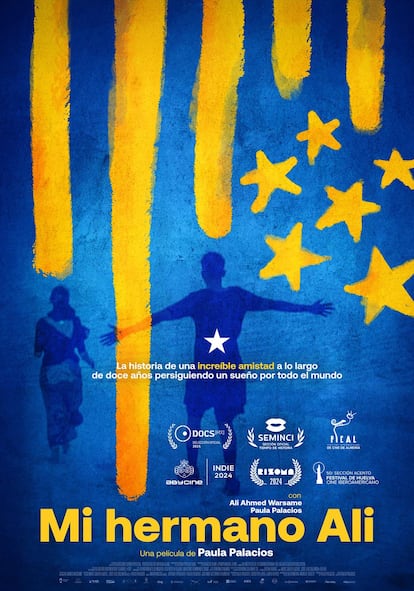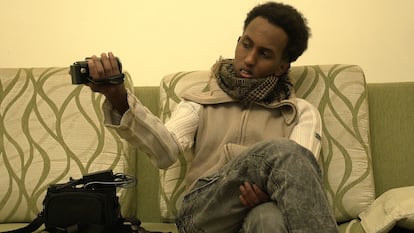At the end of 2011, Ali Ahmed Warsame, a 15-year-old Somali boy, was admitted to the Chernigov immigration detention center, northern Ukraine. He had been stumbling through the Slavic country for a year, where he had run, crossing the border from Russia. Half a year after his entry into what for him was “a prison”, in May 2012, a young Spanish filmmaker, Paula Palacios (Madrid, 1983), appeared there. They had met months before, on the border, where she was filming a documentary about refugee women for the Arab television Al Yazeera: “Ali approached me, he talked to me about UEFA (the European soccer league), geopolitics, Obama and the United States, from the Spanish economic crisis and Bankia. “It surprised me,” says the director. That was the beginning of a friendship that has developed (and recorded) for 12 years and that has taken them halfway around the world: Ukraine, the United States, Qatar, Saudi Arabia and Spain. On October 23, Ali Ahmed Warsame (27 years old) and Paula Palacios (41) burst onto the stage of the Zorrilla theater in Valladolid, in the middle of Seminci, the International Film Week in the city of Pucelana. Together they presented the documentary that narrates their adventures, My brother Aliwhich on December 18 was nominated for the Goya in the category of Best Documentary Film. An unprejudiced story in which both migrate to each other’s world and naturally deal with all kinds of topics: freedom, love, sex, faith, feminism, motherhood…
Ask. How does a chance encounter in pre-war Ukraine end up becoming a documentary?
Answer. Ali was a 15-year-old boy, very smart and hesitant. He managed to get my Facebook profile and for the five months following that meeting he wrote to me every day, to convince me to make a film about him and his life. He was convinced that a film project could get him out of the hole he found himself in, in a lost and forgotten corner of the world.
P. And he convinced him.
R. Yes. At that time I was a very young director, eager for adventure and with time. I got carried away. I entered the detention center to make a documentary about him and the situation of other Somali migrants (there were 22) and ended up focusing on Ali. When he was released from prison, I gave him a camera so he could record his daily life. I returned to Ukraine many times until Ali managed to leave the country.
P. Didn’t you think that by achieving Ali’s dream of living in the United States, all his work could go to waste?
R. No, it was an unexpected twist for the film, something unimaginable. Ali was going to fulfill the first dream he told me about when we met in prison. I couldn’t travel with him, but he carried the camera, our bond for 12 years, and he continued to record himself. Afterwards, I went with my team to film in Grand Rapids (Michigan), the North American city where Ali started a new life at the age of 17: he shared a flat with two other migrants. He went to high school and, thanks to the Bethany Christian Services Organization, he had a monthly help of $800 to pay his rent and his maintenance.
P. But that help wouldn’t last forever…
R. Of course, when I turned 21 it was over. Coming of age led Ali to the real American world. That was a very critical moment, we grew apart.
P. Because?
R. Well, I think because he got overwhelmed and wanted me to pay him. I explained to him that the agreement was different and that I was making enormous efforts to record his entire story. He didn’t understand it at that moment and that separated us for four years, during which we kept in touch through social networks to find out about our lives.
P. When does the reunion occur and why?
R. We met again in Doha (Qatar). The plan was to go to Kenya together to see his mother and brothers. But, in Doha he told me that he was going to get married and that he wanted me to meet the woman who was going to be his wife. She lived in Jeddah, Saudi Arabia. He worked as a transporter in the United States driving a truck. He traveled for weeks on end, earned good money, had traveled to Mecca and met her there.
P. But how did you get married so far away living in the US?
R. . I believe that Ali experienced a personal crisis. He suffered a disenchantment with the American dream. It wasn’t what he expected. He took refuge in religion.
P. And it changed?
R. I don’t know. At first I thought he had changed, but in hindsight, in reality, I had not been able to see the religious side he has always had.
P. What has Ali given you?
R. Access to a universe that was very distant for me.
P. And what has it given you? My brother Ali?
R. The film has shown me how many views there can be of the same story, each conversation is different, everyone focuses on one thing.


